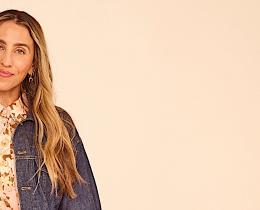Brené Brown reveals how vulnerability is the path to a full life.
Omega: In your research, you’ve documented the importance of vulnerability in our personal and professional lives. Why do you think it’s important for us to learn to feel vulnerable?
Brené: Vulnerability is about uncertainty, risk, and emotional exposure. We have convinced ourselves that if we armor up every day—if we try to be perfect or know everything—then somehow we can minimize the things we fear feeling the most: disappointment, fear, shame, and unworthiness.
But these emotions are part of the human experience. When we minimize them, we end up cutting ourselves off from the meaningful experiences that are born of vulnerability—that require vulnerability—including belonging, joy, creativity, innovation, trust, and empathy. These are not only essential to living and loving; they’re also essential to leading.
What we need to figure out is how to have the courage to show up, to be imperfect, be human, be seen, ask for help, own our mistakes, learn from failure, lean into joy, and celebrate success. Can we do this ourselves and can we support those around us when they make the effort to do the same?
Omega: Our culture does not usually equate vulnerability and leadership. How does being vulnerable square with our perception of leaders as being strong, even-keeled, and in control?
Brené: Relationship is the currency of leadership. Leaders who are willing to be transparent and authentic are people we’re eager to support. They are the ones we want to show up for, whose teams we want to be a part of because they’re open to us sharing and expressing our passion and our purpose.
Omega: How do you define leadership?
Brené: A leader is anyone who holds her or himself accountable for finding the potential in people and processes. Leadership has nothing to do with position, salary, direct reports, or status anymore. There are leaders at every level of organizations, schools, and communities who, every day, are defining strategy and shaping culture. There are leaders and team members, but it’s not the same as the old leader-follower paradigm because everyone on the team can act like a leader by being engaged and showing up with their ideas, even if it means finding the courage to say, “I think we’re headed in the wrong direction.”
Omega: How you personally relate to being a leader?
Brené: I practice being vulnerable. Every time I give a talk, I have to consciously choose. I can talk about the science of variables predicting self-conscious emotion or I can tell a really hard, true story about a conversation I had with my husband. For me, it’s constantly about really having the courage to see the armor I’ve put on and to take it off.
Mindfulness practice has been key for me with this. Whenever I feel aggressive or want to give up or blame someone, I ask myself, “What am I actually feeling? What’s going on right now?”
Omega: What is the relationship between shame and vulnerability?
Brené: I talk about shame as these gremlins that fuel two primary messages: “You’re not good enough,” and “Who do you think you are?” These shame gremlins are right there when you are thinking of doing something that makes you feel vulnerable, whether it’s putting a new idea out there, negotiating a raise, or speaking out against something that is unfair. Shame is the thing that says, “Hey, keep quiet. You’re not smart/good/informed enough. No one will like you if you say that.”
Omega: Have you found that men and women experience shame and vulnerability differently?
Brené: Vulnerability is difficult for both men and women, but there are some differences. The number one trigger of shame for men is being perceived as weak. If being vulnerable is likened to being weak, then it becomes very hard for men to say, “I don’t know everything. I need your help. I need your ideas.”
Women tend to feel shame when they are not perfect. There’s an underlying message to women that they have to do it all, do it perfectly, and “never let them see you sweat,” which is impossible!
If men and women want to be vulnerable, if we want to dare greatly, we have to clearly identify the gremlins that keep us small. By daring greatly I don’t mean jumping out of a plane or taking your business public, although that could be daring greatly for some people. I mean daring to say things like, “I don’t understand,” or “I’m in over my head.”
Omega: Your book Daring Greatly takes its name from a Theodore Roosevelt quote that had a significant impact on you. What does daring greatly look like in your life right now?
Brené: The full quote is, “It’s not the critic who counts. It’s not the man who points out how the strong man stumbles or where the doer of deed could have done better. The credit belongs to the man who’s in the arena, who strives valiantly, who sometimes knows triumphs and sometimes fails, but at least fails while daring greatly.”
After my TED talk on vulnerability went viral, I went through a very difficult time. I realized I had engineered my career to be pretty small because I was afraid of being subject to a lot of criticism. And I was. But I learned that when you take a stand on something, some people are going to be mean-spirited. I had to learn not to listen to everything everyone said and to discern what was helpful feedback, even if it was hard to hear.
The whole process helped me realign with my faith and my values. I recognized that I need to continue to put my work out in the world, no matter how it is received. Even though I have this book and this popular TED talk, I could wallpaper my house with rejection letters! But I need to have the courage to keep going, and the more I stand firmly in conscious contact with God, the more I am clear about who and what matters in my life, and the more I am able to use my voice in service of what I believe to be true.
Omega: When you feel particularly vulnerable, do you have a practice that helps you?
Brené: In addition to going to church and being a member of a faith community, I have regular daily practices like gratitude, creativity, mindfulness, and time in nature. I also pray, but I pray like a fifth-generation, hard-living Texan. I sing along to spiritual music, but music with a little salt—like Loretta Lynn’s “How Great Thou Art,” or Willie Nelson’s “Amazing Grace.” Mostly I just try to keep showing up.
The bottom line is that vulnerability is scary and it feels really dangerous, but it’s not nearly as dangerous or scary as spending your life on the outside looking in and wondering, “What if I had chosen to show up?”
Tell us about your experience with vulnerability at OmegaStories@eOmega.org.



